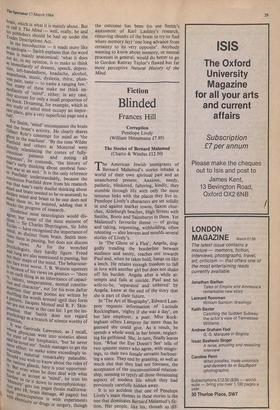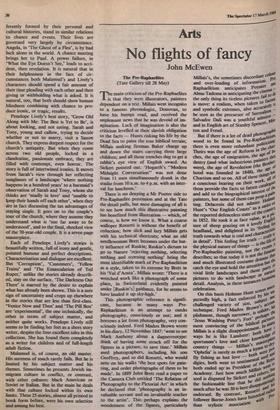Fiction
Blinded
Frances Hill
The Stories of Bernard Malamud (Chatto & Windus £12.50)
The American Jewish immigrants of Bernard Malamud's stories inhabit a world of their own spiritual past and an unanchored present. Anxious, needy, pathetic, blinkered, faltering, kindly, they stumble through life with only the most tenuous links with the places they live in. Penelope Lively's characters are set solidly in and against market towns, Saxon chur- ches, Aldeburgh beaches, High Streets with Smiths, Boots and Sainsburys in them. Yet Malamud's favourite theme — of giving and taking, requesting, withholding, often relenting — also leavens and moulds several stories of Lively's.
In 'The Ghost of a Flea', Angela, dog- gedly treading the borderline between madness and sanity, reaches out towards Paul and, when he takes hold, hangs on like a leech. He retains enough freedom to fall in love with another girl but does not shake off his burden. Angela after a while at- tempts and fails at suicide. Paul and his wife-to-be, 'separated and tethered' by Angela, know at the end of the story that she is part of their future.
In 'The Art of Biography', Edward Lam- prey requests information of Lucinda Rockingham, 'eighty if she was a day', on her late employer, a poet. Miss Rock- ingham offers Lamprey far more than he guessed she could give. As a result, he spends a whole week in her house, neglect- ing his girlfriend. She, in turn, finally leaves him. 'What the Eye Doesn't See' tells of two spinster sisters who agree, with misgiv- ings, to their two female servants harbour- ing a niece. They end by granting, as well as much else that they had not foreseen, the acceptance of the unconventional relation- ship, seeming to typify all those threatening aspects of modern life which they had previously carefully hidden away.
It is no accident that one of Penelope Lively's main themes in these stories is the one that dominates Bernard Malamud's fic- tion. Her people, like his, though so dif- ferently formed by their personal and cultural histories, stand in similar relations to chance and events.. Their lives are governed very largely by circumstance. Angela, in `The Ghost of a Flea', is by bad luck alone in the world. A chance meeting brings her to Paul. A power failure, in `What the Eye Doesn't See,' leads to acci- dent, then revelation. It is natural that in their helplessness in the face of cir- cumstances both Malamud's and Lively's characters should spend a fair amount of their time pleading with each other and then giving or withholding what is asked. 11 is natural, too, that both should show human blindness combining with chance to pro- duce ironic, or tragic, results.
Penelope Lively's be story, 'Grow Old Along with Me: The Best is Yet to Be', is about looking., and not seeing. Sarah and Tony, young and callow, vying toto decide whether or not to marry, visit a Saxon church. They express deepest respect for the church's antiquity. But when they come across two old people, locked in a clandestine, passionate embrace, they are filled with contempt. even horror_ "Ilse. story is full of intertwined ironies. It muses from Sarah's view through her reflecting sunglasses of a landscape 'where nothing happens in a hundred years' to a barest 's observation of Sarah and Tony„ whom she thinks are 'madly in love' and "unable to keep their hands off each other', when they are in fact discussing the tax advantages of slaying single. It goes on to the couples tour of the church, where they assume they understand what is 'too far away to be understood' , and to the final, shocked view of the 70-year-old couple_ his a sewn-page masterpiece_ Each of Penelope Liitdy's nodes is beautifully *viten, full of irony and geode, Pointed human- and perfect desaiPtions. Characterisation and dialogue are excellent. But 'Corruption', `Casa omens', Trains' and The Emasculation of Ted Roper; unlike the stories already describ- ed, stay on the surface- 'The Daftness Out There' is maned by the desire to explain what has already been shown_ This is a sore sign of uncertainty and aops up ehewhere in the stories that ate less than fast-class 1Venice NOP,. and Then' and "The FIR Box' are `experimental', the ore technicaly, the other in terms of subject matter, and neither quite marks_ Penelope Livdy still seems to he axing her feet as a shoo gory writer, despike the four eaceneot tales is ibis collection_ She has found than compleudy as a writer for children and of MI-length adult fiction_
2vIalamud is, of coarse, an old master_ His sureness of touch rarely fails_ But he is limited by his subject stager and his themes. Sometimes he presents Jewish im- migrant culture in conffict, or contrast„ with other crdnireK black American or Soviet or 'tam_ Bat it the inalthe dads with dial outage locked within its own Emis_ These 25 stories, almost all printed in book form befame, were his own selection std among his beg,















































 Previous page
Previous page